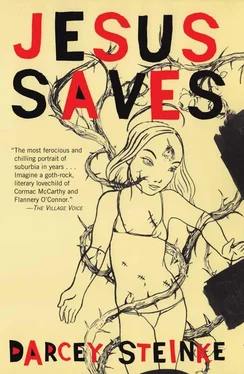“So let us remember Sandy Patrick in an aura of divine light. Let us pray for her in hope that her pain will not be wasted, that in turn it will work as an elixir, just as Christ's blood does in communion, to turn our black hearts pure and white as the first winter snow. In the name of our Lord Jesus Christ, Amen.”
The organist played the first chords of the next hymn. Ginger watched as Mrs. Mulhoffer moved discreetly out of the front pew and down the side aisle. Several other people edged out of their seats, following her, all their expressions tense with outrage and indignation. She heard a woman whisper to her husband, “How dare he say we killed that little girl.” Ginger'd heard them talk; they said that Ruth Patrick deserved what she got, that she was one of the divorcees that got drunk on singles’ night at the Holiday Inn Lounge and that she took continuing education classes just to meet men. The ushers passed the red velvet offering bag from pew to pew.
Sandy'd been gone for months. Dread shivered up Ginger's spine. It seemed like bad luck to mention her. The ushers, jovial and unfazed, walked in formation down the center aisle, carrying red bags of green money and checks. All four could be brothers in their dark suits with the brocade Maltese Cross pocket patch. They shared the same temperament too, self-deprecating and funny; Ginger liked how they joked with her about oversleeping and how during the sermon they slipped outside to smoke.
Her father took the bags, settling each on top of the other. Then held all four up and with a little prayer, he consecrated the cash for Jesus. She pitied him. This was all he had to offer his God.
In the Bible, God was famous, as in the story of Cain and Abel, for being more pleased by living animals and their slaughter than by a basket of inanimate vegetables. She imagined a lamb struggling, its little hoofs beating against the slate, her father with one hand holding the frantic animal down and with the other slicing into its throat, blood spurting out, soaking the altar cloth, splattering his linen robes. Everyone would be relieved, grateful and happy to be alive. People would sense that someday they'd witness their own death but somehow still live.
The ushers returned to the back. One was holding out his hand, welcoming her to line up for communion. The wine would hit her empty stomach like a French kiss and besides, in her mind communion was a paltry and unsatisfying ritual, nothing compared to its precedent, the lush and drunken last supper, where disciples feasted on bowls of olives and roasted chicken and the bread was so delicious Jesus compared it to flesh. No, today she wouldn't go; better to eye the altar from here. She shook her head, but the lady next to her told her little boy she'd be right back and slipped past Ginger. The boy was leaning on a hymnal coloring a Sunday school sheet that read God Made Me. As the line grew she recognized only a few of the parishioners; frizzy-haired Jean Gephart, who was afraid of her dishwasher and fat Mrs. Clayton and her startled-looking husband Herman. There was Ann Heinz, the goody-goody girl in her floral dress with the lace collar and her exhausted alcoholic mother Barbara. Old Klass was here today too; he was the only member left from the old days. Most of the old Germans lived in row houses or garden apartments downtown; they hadn't taken to the new church building. Her father hired a van to go down and get them Sunday mornings, but the only one who ever came, sitting alone in the back, dreaming like a wizened duke, was old Klass. He was tiny now, less than five feet, and seemed smaller still in his three-piece suit. He kept cinnamon candies in his pockets for the children and was always calling himself a Prussian Lutheran and a libertine.
She watched her father raise his hand and make the sign of the cross to dismiss the first group of communicants. All rose with their heads bowed. The organist used the softer tones of the choir keys and only a few people sang.
Take my will, and make it thine / it shall be no longer mine /
Take my heart, it is thine own / it shall be thy royal throne.
Her father lifted his head and glanced at her. His features were not tense or angry, but Ginger knew what he wanted her to do. She stood with an irreverent swivel of her hips, loosened herself from the pew, and walked up the aisle to the far end of the communion rail, knelt down, watched from the side of her eye as he placed a wafer on each extended tongue. This is his body given unto you for the forgiveness of sins.
The real world should seem foreign and out of focus from inside here; a church was a way station between this material world and the next immaterial one. But she saw cars like meteors made of colored light zoom past on the highway. And heard a truck heave and honk, the driver hurling his load into the express lane.
He moved closer, smelling of nautical aftershave and dry toast. This is his body given unto you for the forgiveness of sins. He placed the wafer on her tongue and she brought it back into the wet cave of her mouth. The host stuck to the roof, tasted like typing paper, like white grade-school paste.
He began again with the silver chalice. This is his blood shed for you. He tipped the cup to a man's lips, then lifted it, cleaned that spot with a piece of white flannel. This is his blood shed for you. He was near. Flutter of robes, his muffled side step. She raised her head, took the cup's lip between her own, and looked into her father's face. Large pores were open and oily around his nose, and his eyes reflected pinpoint faces of parishioners in the first pews. This is his blood shed for you. The red wine stung her gums. She tried to swallow but a cramp punched into her abdomen. Flinching, her mouth opened and wine dribbled down her chin, spattering circles round and soft as berries on the wooden rail. How ridiculous, she thought, that this is happening now. He was already behind the altar, making the sign of the cross, touching his forehead, his heart, then each shoulder. “Go in peace,” he solemnly said.
As she rose the muscles in her stomach contracted and she felt that monthly paradox, a light-headedness with unbearable bloody weight. She walked along the side aisle with her thighs clamped together so that no blood would drizzle down her legs. A man sat in the back row in a baby blue golf sweater silently moving his lips, not the wide-open shifts of singing, but whispering furtively to the trustee beside him.
She hurried out the narthex doors, down the stairs toward the basement, past rows of Sunday school rooms, the nursery. Posters lined the hallway, enlarged flowers with Bible verses printed underneath and a banner that proclaimed PEACE TO ALL WHO ENTER HERE in big, badly cut, felt letters. She swung open the door to the ladies’ room and flipped on the light, pushed open the stall door, squatted back toward the toilet seat and reached under her skirt, pulling her pink cotton panties down. It was one of the bad pair with the loose elastic waistband and the pee-stained crotch. Now the material there was blood-soaked and heavy, smudges of red on the inside of her thighs. She sat on the cold toilet seat, listening to the last verse of the communion hymn.
Take my love; my Lord, I pour / At thy feet its treasure store /
Take myself, and I will be / Ever, only, all for thee.
At Christmas her doll Kimmie was always baby Jesus, and she was always an angel with a tin foil halo and cardboard wings. Sometimes she chewed on her long cuticles and said The body of Ginger take and eat. Once when she was still in her crib an angel had hovered in the corner of her room all night, and on Halloween she saw a demon squatting in the bare branches of the pear tree. She remembered the exact moment she'd first found out that the soul wasn't a real organ like one's heart or kidneys and the story her father told her about the little boy who wanted to get to heaven so bad he kept trying to ride his Big Wheel off the garage roof.
Читать дальше












